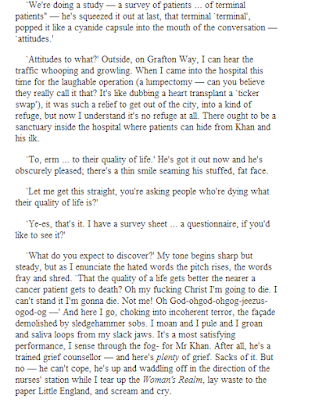This post is a callback to a talk I saw in March, in which John McGowan from Salomons explored the way psychiatrists are represented in film. With so many villainous psychiatric professionals he asked, is Hollywood ready for a hero psychiatrist? This is a good question to explore. How psychiatrists are represented in film and literature is an index of how they are held in our collective imagination. His survey of recent films suggested something like ambivalence toward the mind doctors. However, psychiatrists have been heroes in the past. The final scene in Hitchcock's Psycho, when Dr. Fred Richman (or Richmond? IMDB is ambiguous here) delivers a confident breakdown of Norman Bates' mental process, is very telling. That was the very early 1960s US, when psychiatrists ruled the cultural interpretation of the mind with their baroque psychoanalytic theories and formulations (until the 1980s they dominated US psychoanalysis as other professionals were excluded from analytic training institutes). Hitchcock's doctor is dashing, fluent and definitive. He is also almost omniscient. What a good thing that we don't hero worship our mind doctors like that anymore!
By now psychiatrists have quite a long and complex place in film and literary history. What about clinical psychologists specifically? You don't find them very much in fiction. Pat Barker once wrote a novel Border Crossing about a child psychologist, and the Sixth Sense's Malcolm Crow is a psychologist too. They may not be heroes, but they are good guys. Sensitive, intuitive and basically virtuous. Often though, clinical psychologists are lumped in under the vague category of mind doctor. You don't really know whether they are psychiatrists, psychoanalysts, psychotherapists, or what. Authors and directors don't really care about the boundaries between psy-professionals that we practitioners like to police so carefully.
There are two exceptions to this trend that I am aware of. They are revealing because they both tell a similar story. The first is from Norman Rush's incredible novel Mating, which is an epic story of love and the life of the mind, centred on the figure of Nelson Denoon and an unnamed female narrator. The narrator loves Nelson with a sort of respect and passion that can only be conveyed in a reading of the book. She becomes dismayed when, after she crosses the Kalahari desert to join him at a utopian community he has been developing, he develops a sort of passive indifference to ideas and projects he once found important. She enlists the help of a clinical psychologist to try and get him back, but has to grapple with the contempt with which Denoon holds them:
"About as respectable as colonic irrigation"! I found that part smarted a bit. Rush has spent a lot of time getting us to trust Denoon's opinion, and it is impossible to read the novel and not love him yourself.
Another example is in Will Self's How The Dead Live. Self is very interested in (and skeptical about) the psy professions. His character Mr. Khan is specifically a clinical psychologist (in contrast with one of Self's recurring characters Dr. Zach Busner; a psychiatrist), and seems to have been included as a form of deliberate professional satire. Here he is meeting the novel's main protagonist Lilly Bloom, who is about to die of breast cancer (a fuller excerpt is here, and is worth reading):
Yuck! What an unattractive portrait; albeit one I recognise in real-life descriptions from people who have received help from clinical psychologists. At the risk of denigrating my colleagues, I wonder if there is a grain of truth in Self's unflattering depiction. To a some extent he is wringing a laugh; using a self important professional for comic relief. But satire is a serious business and should make us think about how we are with people, and in what ways we fail to accurately see ourselves in those interactions. I'd be interested to know about any other clinical psychologist appearances in the fictional domain. How else are we perceived and imagined in the culture?


http://psychokinesis.club is blog that focuses on an individual to become the best psychokinesis they could possibly be, Generally the influence the result of a circumstance utilizing the intensity of their brain by obtaining supernatural power all the more legitimately identifies with the development of items utilizing the intensity of the brain, yet psychokinetic forces might be utilized to show explicit results or occasions of pretty much any sort,
ReplyDeletehow to control someone's mind